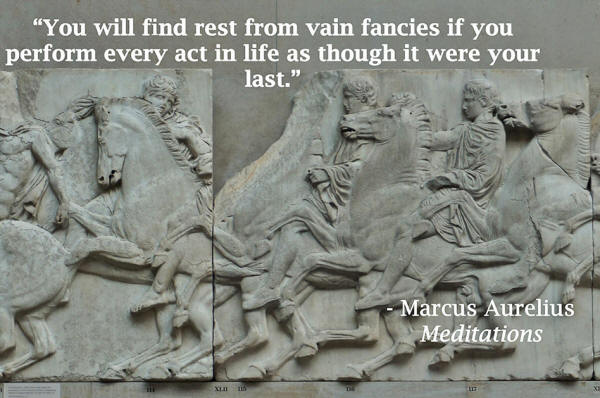|
from ClassicalWisdom Website
The ancient Stoics, who lived in times that were harder and more perilous than our own, developed a unique and firm perspective on how to cope with grief.
This makes sense in light of Epictetus' personal history.
Born into slavery in
modern-day Turkey, Epictetus knew from an early age what it meant to
be unable to have a direct influence on the world around him.
If anyone could be said
to have been dealt a poor hand in life, Epictetus qualified.
Instead, he formulated a philosophy that emphasized the importance of personal responsibility in the face of unfair external events.
Because of this, Epictetus argued that the best shield against grief was not finding ways to guard ourselves from loss, which is impossible, but rather to teach ourselves to react to it better.
Instead of hating the
gods or the universe after the death of a loved one or some other
significant loss, Epictetus said that we should find peace in the
fact that nothing in life lasts forever, including the time we get
to spend with our loved ones.
on this side of eternity is temporary, we must accept that they will come to an end and, so we should savor the time we have.
Once that gift has left someone's life, they must acknowledge that the time for enjoying that particular treasure is over.
Just like you wouldn't expect to be able to enjoy a piece of fresh fruit out of season, so too you shouldn't expect to be able to savor time with a loved one beyond whatever amount of time has been appointed for you to spend together.
According to Seneca,
opponents of Stoicism criticized the philosophy's view of mortality
as too harsh and strict because of its supposed lack of tolerance
for the emotion of grief.
However, just because we
experience certain emotional responses in the face of loss does not
mean that we have to be ruled by them.
You won't be able to
avoid feeling rightfully sad at such a great loss, but if you are
emotionally reserved, you don't need to feel obligated to cry more
just because your siblings do.
and the opinions of others should not determine the extent of our grief...
Natural disasters and the choices of others are outside of our power, but each of us can practice self-discipline.
Instead of being battered about by external events and distressed by the decisions of others, Marcus made a conscious, daily effort to control the way that he responded to these things.
Our emotions can't be
switched on and off like a machine, but we can condition our minds
over time to respond to events in a certain way.
Along these same lines, Marcus says,
The mind can be conditioned to be more resilient in the face of loss.
While it can be easy to let our emotions, including a powerful feeling like grief, get the better of us, Marcus urges us to choose the path that leads to resilience and strength.
The theme of memento mori,
Latin for, "Remember that you die," can be found in the writings of
the prominent Stoics, from Seneca the Younger to Epictetus
to Emperor Marcus Aurelius.
Just as we understand
that a football player can kick a 60-yard field goal only because of
constant practice, we must realize that a true Stoic can stay strong
in the face of tragedy only after a lifetime of preparation.
Such frequent remembrances will strengthen your ability to prepare for the imminent loss brought by death, either your own or that of your loved ones.
Grave of James Bailie (died 1746).
Detail.
The Stoics urged a focus on self-control and self-discipline as an antidote to being tossed about by life's difficulties. Grief will always hurt, but we shouldn't be carried away by it or influenced to exacerbate our grief just because others expect it of us.
You can train yourself to control your reactions to loss, especially by remembering the transience of life.
Over time, you can make
yourself a mentally stronger, more resilient person...
|





